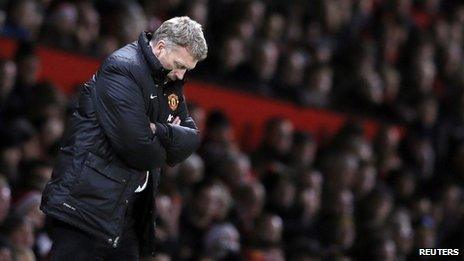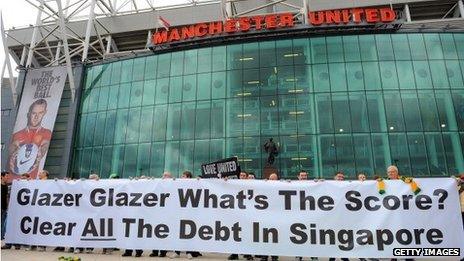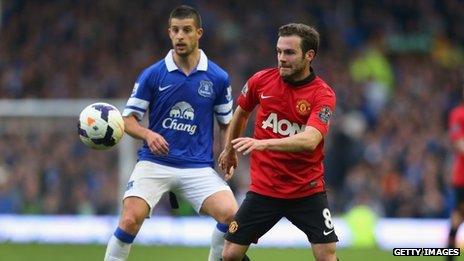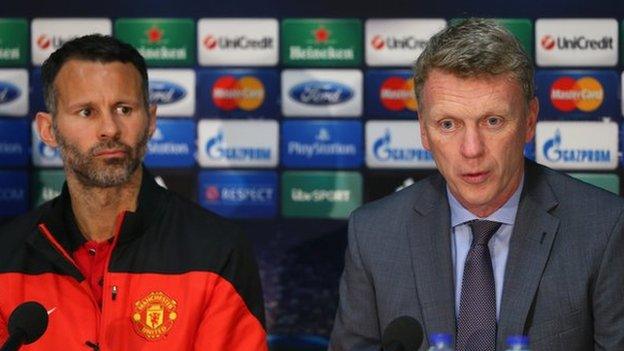The price of failure at Manchester United
- Published

David Moyes has been sacked after 11 months in charge of Manchester United
Manchester United is one of the richest football teams in the world, but its performances on the pitch this season under David Moyes could dent its balance sheet.
Revenue at the club for the year to 30 June 2013 was £363m. That was an increase of 13% on a year earlier.
Manchester United also reported a net profit of £146m for 2012/13.
But the club fell one place in world football's rich list, being pushed into fourth place by Bayern Munich.
That did not seem to be of immediate concern to the Glazer family, the majority shareholders in the club, when accountancy firm Deloitte published its annual Football Money League.
But to Manchester United's 660 million fans worldwide, it was the consequence of several years' failure to invest in the club.
Champions League
Manchester United's failure to qualify for the Champions League for the first time in 19 years will almost certainly have a financial impact.
In its last set of accounts, Manchester United admitted that its "revenue streams are driven by the performance and popularity of our first team".
The club said "significant sources" of its revenue came from the team's historically strong performances in the Premier League, the FA Cup, the League Cup, and Champions League.
"Our income varies significantly depending on our first team's participation and performance in these competitions," the club added.
While it is tricky to evaluate the size of that impact as yet, last year the club earned £29.5m from Europe's premier club competition. That was down from £34m a year earlier and £51m the year before that.
Deloitte predicts the loss of Champions League football next season could cost the club up to £50m - around 10% of Manchester United's expected revenue for next year.
That estimate is based on lost broadcast revenue and ticket sales, as well as the loss of any prize money.
Its last set of accounts for the year to 30 June 2013 showed Manchester United's revenue from all broadcasting was £101.6m.
That said, Manchester United's global brand continues to grow.
Deloitte's, external Football Money League shows the club's commercial operations grew by 30% to £34.9m in 2012/13.
Multiple new global and regional partners were added, aided by the addition of a new sales office in Hong Kong focused on one of the club's key markets of Asia.

Manchester United fans protest against plant to issue shares on the Singapore stock exchange
A world-record shirt sponsorship deal with General Motors (Chevrolet), worth $559m over seven years almost certainly helped boost revenues, and despite not their logo not appearing on Manchester United shirts until 2014/15, delivered about £12m in the year.
In total, the club has signed deals with six new sponsors, including Unilever and the Hong Kong Jockey Club, as well as Aperol cocktails.
Hedge funds
But the Glazer family's £800m takeover of the club in 2005 has long been a bone of contention for some fans, who claim the family has stripped Manchester United of assets and saddled it with hundreds of millions of pounds of debt.
Opponents of the Glazers have regularly voiced concerns about the financial stability of the club following the takeover, which was funded by loans from US hedge funds.
Critics argue the Glazer family have spent years paying off those debts - some estimates put the total amount of debt and interest repaid at £400m - when they should have spent money on building a new squad to guarantee a seamless transition, following the retirement of Alex Ferguson last year.
They also cite the fact that Ferguson was forced to tempt Paul Scholes out of retirement to play for the club in 2012 as evidence of the Glazers not spending enough on maintaining the squad.
One critic is Jim O'Neill, the retiring chairman of Goldman Sachs Asset Management and a Manchester United fan who challenged the Glazer family for ownership of the club in 2010.
He told BBC Radio 4's World at One: "Manchester United is a global brand and it is owned by people who are not particularly interested in what it does on the football pitch, they are more interested in revenue."
He added that for Manchester United to remain the global brand it is today, it needed to stay in the Champions League in order to maintain its sponsorship deals.
Mr O'Neill also refused to comment on whether he still harboured ambitions to take over the club.
The issue of new shares in the club on the New York Stock Exchange in August 2012 helped pay down some of the club's debts, halving annual interest payments to just over £20m.
Its debts were refinanced again in May 2013, reducing the club's interest payments by a further £10m a year.

Juan Mata signed for Manchester United in January for a club record £37.1m
David Bick, chairman of Square1 consulting, told the BBC earlier this year that the deal meant Manchester United would now be paying off their debts "on more reasonable terms".
He said the club still had "a long way to go" in paying off its debts, but added the Glazers had made the most of the club's global presence by drawing revenue in from places such as East Asia.
"It's a massive global brand, they have extracted commercial income from all corners of the globe," he said
Record signings
The club has not exactly shied away from spending money on new players and is reportedly ready to hand its new manager a £100m war chest for new summer signings.
If it hopes to return to the top of the Premier League next year and limit the damage done by its failure to qualify for the Champions League this year, it may need to spend big.
In January, Manchester United broke a new club record when it signed Chelsea player Juan Mata for a £37.1m.
A month later, it was revealed the club had agreed terms with star England striker Wayne Rooney, keeping him at the club for another four years on a reported weekly salary of £300,000.
Deloitte estimates that Manchester United's total wage bill for the financial year 2012/13 stood at £182m, overtaking Chelsea's wage bill of £178m for the first time and coming second only to rivals Manchester City who paid £233m in wages in the financial year.
That was an 11% rise on a year earlier and before either the Mata or Rooney deals were announced. Mata's wages are expected to amount to £8m this year alone.
Some believe it is inevitable the club will be forced to offload other high earning and ageing players, including Patrice Evra and Rio Ferdinand - with Manchester United captain Nemanja Vidic already heading to Inter Milan at the end of the season - in order to be able to buy in fresh players in the summer.
But as rivals Liverpool have learned, the lack of Champions League football may hamper Manchester United's ability to attract the players it wants, regardless of the money it has to spend.
- Attribution
- Published22 April 2014

- Attribution
- Published22 April 2014
- Attribution
- Published22 April 2014